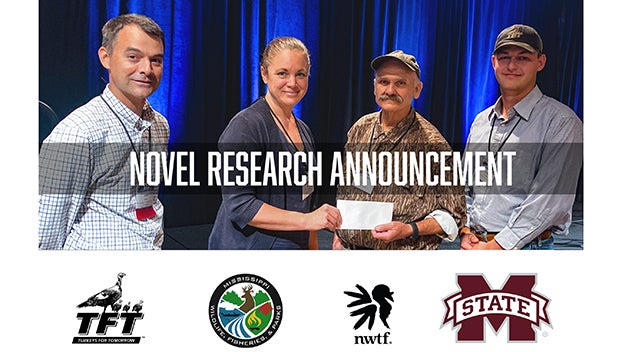Turkeys for Tomorrow: MSU, MDWFP, Non-Profit partner for research project with wild turkeys
Published 4:17 pm Tuesday, June 28, 2022

- Turkeys For Tomorrow (TFT) is a non-profit organization partnered with the Mississippi State University, Mississippi Department of Wildlife, Fisheries and Parks to fund wildlife research in turkeys. Pictured here from left is MDWFP Turkey Program Director Adam Butler, MSU’s population ecology professor Dana Morin, TFT Secretary Mark Yarborough and TFT Marketing Director Chase Grubbs. (Courtesy Photo | TFT)
STARKVILLE — Turkeys For Tomorrow (TFT), a non profit organization, has partnered with Mississippi State University and the Mississippi Department of Wildlife, Fisheries and Parks to fund wildlife research.The National Wild Turkey Federation is an important funding partner in the project.
Southwest Mississippi was forecast to have a comparatively less than average turkey harvest this year due to lower poults per hen numbers in the last few summer field surveys. Research projects with wild turkeys help the MDWFP better understand the bird and what type of management works best.
The project will use a new non-invasive technique to gather DNA from materials turkeys leave behind in the field, according to a press release from TFT. MDWFP’s Turkey Program Coordinator Adam Butler said the MDWFP is the primary funding agency and will assist in coordinating field work.
Samples from turkey materials such as fecal droppings and feathers will allow individual birds to be identified and lead to a more precise estimate of turkeys in the landscape. Researchers will be able to investigate turkey health and their relationship to diseases, parasites and aflatoxins.
“We will be able to understand disease prevalence and look at health measures,” Butler said. “The hope is to relate that to the population and the change over time. It is the first time this technique has ever been used with Turkeys.”
Mississippi State Ecology Professor Dana Morin said this non-invasive technique is one she has used in research on coyotes and bobcats in the past. They use a method similar to forensics work to collect samples. A research technician from the Carnivore and Population Ecology lab at Mississippi State University will collect the samples.
Butler said he is looking forward to the reduced cost of the project technique. In the past, they had to use radio collars to track birds and it could be time consuming. Now they will be able to look at more sites simultaneously.
This study will be conducted on eight sites throughout the state. Four of those sites will be on private lands and four on public lands. Butler said those public land sites will likely be WMAs who have a shortened turkey season.
Morin said it will be like a natural experiment with each site having different habitats, food sources and management situations. She is looking forward to how it turns out.
“We can extract the DNA and RNA of anything shed,” Morin said “We are using the fecal samples we get to see what they are eating and can get the DNA of whatever they are eating.”
TFT’s press release said the project hopes to estimate the density of male and female turkeys and breeding seasons survival. It will help with camera survey calibration and evaluate relationships between poult per hen and estimated population density the following year.
Research will begin in February of 2023 and the first year of study will be funded. Morin said they plan on sampling repeatedly in February, May and August and can potentially estimate survival of birds.
While it takes a month or two to extract the DNA from samples, it doesn’t take long for them to get the Single Nucleotide Polymorphisms and find the differences, she said. As for the continued funding for the project, it will depend on the first year.
“Everyone seems excited about it. What will be neat is we can look at disease and diet of birds,” Morin said. “We will get a better idea of what is limiting turkeys. I’m working with Mississippi black bears and bear projects in North Carolina and Maine. The Turkeys have been a fun change for me.”





